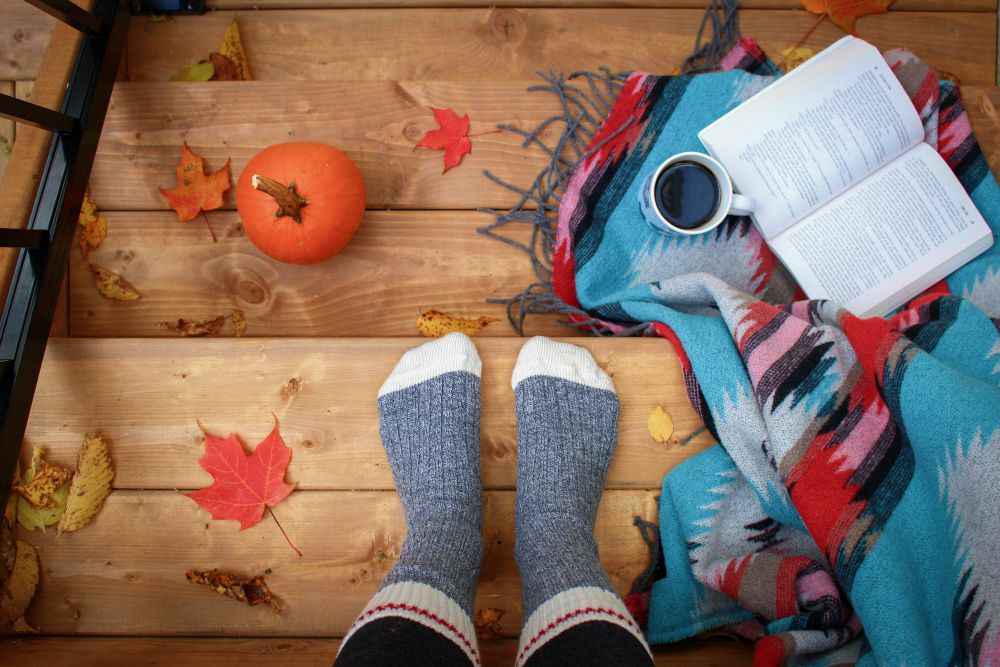
(Unsplash/Alex Geerts)
The weather has shifted. October's flaming golds and blues have given way to sullen purples and greys. The air is riddled with unexpected gusts. Dead leaves feel brittle on the pavement or have begun to rot into the earth. The smell of them is very clear in the new chill and mingles with wood smoke in a combination peculiar to the early weeks of November, before cinnamon and cloves and peppermint and roasting meat and all the other holiday smells burst onto the scene. It's a quiet and momentary stillness, after the harvest has come in but before the feasting has begun.
Because it is so quiet, so melancholy, so grey and empty, it's one of the coziest times of the year. There is not much to do, and nowhere to go, and it's getting colder — so drink a brown nutty beer or good tea from a round yellow pot. See a pale sliced moon glitter behind the trees, November's most reliable source of light. See the shadows move over the ground, hear the wind rattle between the houses, and wrap yourself in blankets, light candles against the suspicion that November calls up wild things in the moonlight, and not all of them are known to you.
The temptation to wrap yourself in blankets against a cold and shadowy world feels almost irresistible. The only question is whether you prefer your terrors apocalyptic or drearily mundane. You can fear massive climate-induced civilizational upheaval, or you can fear getting hit with a debilitating medical condition that your insurance refuses to cover. You act and pray and give, but at a certain point the mere amount of mental space that grief and horror can occupy becomes untenable. According to an array of lifestyle gurus, the solution to these moments, when the world seems to shrink to single point of darkness, is self-care.
"Self-care" as a discrete concept is largely an internet-driven phenomenon. It can refer to basic life habits of personal maintenance — eating green vegetables, drinking water, getting sleep. But it's most recognizable as the performance of traditionally feminine, affordably elegant, moderately decadent little rituals. Self-care is a 10-step beauty routine at night. It's a pint of cookie dough ice-cream and the 1,000th rewatch of the BBC's "Pride and Prejudice." It's a glittery, fizzy, Instagrammable bath bomb. It is simultaneously a coping strategy, a hashtag, a lifestyle and an industry.
When I call things "self-care," it is mostly as a private joke with myself. "Perhaps I should buy this $350 velvet burnout dressing gown from 1925 — for self-care?" Self-care is, in theory, about being gentle with yourself. But because self-care always contains the threat of its own self-indulgent caricature, it is an easy weapon with which to needle your own weaknesses.
Advertisement
And when self-care does not feel like an admission of self-indulgence, it can feel like an exhausting prescription of excellence. Is it enough to merely moisturize, or should I invest in skin-brightening serums? Am I caring for myself by eating my spinach, or must I also sculpt my abs? How much of my self-cultivation should I spend on finding inner peace, and how much on practicing my French?
Most importantly, how much carefully measured out "me" time, how many products and skills and hobbies and ambitions and in what proportions will finally certify me as a put-together person? "Put-together" is more than mere competence; it's the dream of a fulfilled and acceptable self. It signifies a perfect and static completeness, a satisfying narrative end.
Thus, unless it's a jab at myself, I do not usually call things "self-care." Nevertheless, I find I have a set of pleasures that provide warmth in cold times. Walking as far as I can, up and down hilly land, until my feet are tired, is one. Start out in the morning with a bag of sandwiches and no place to be till evening, and upon homecoming you will sleep the sleep of the dead. Another is perhaps more in the traditional self-care vein: pairing scented bath salts with drinks, like a sommelier of the soaking tub. A dried seaweed mix pairs beautifully with a Boutari Kretikos. A snifter of Calvados complements a brown sugar scrub. And for lavender salts, you can't go wrong with a floral Albariño or some Poire Williams.
I have more. Drinking hot things, rich marrow-y soup, cider, chocolate, grog. Watching the light flicker in the maniacal grin of my jack-o'-lantern, long after Halloween. (Jack-o'-lanterns are not afraid of darkness or anything in it, and their pumpkin bodies bespeak a rich and comfortable human abundance.) Candles in general, really. I spend too much money on them, and when I'm alone in the house, I light five or six, turn off all the other lights, and listen to Loreena McKennitt wrapped in a wool shawl. Spending time in cemeteries, keeping peaceful company with the dead. Walking through a run-down part of town, learning the species of its trees and calculating costs for restoring the trim around leaded windows. Passing a day alone, noticing the play of light and shadow in my neighborhood, watching the domestic quarrels of squirrels and crows. Certain books: Beatrix Potter, Agatha Christie, James Herriot, Tove Jansson, Shirley Jackson.
It may be obvious by now that a preponderance of my warming pleasures involve autumnal delights. This is a kind of poetic justice. A great deal of my resistance to "self-care" stems from a fear of being found unthinking, unimaginative, stereotypically feminine in a way ideally suited to mass commodification — in other words, basic. And yet than there is nothing more basic than a love for fall as a personality trait.
But it may not be so terrible to be basic after all. To love the same things most people love, to be grateful for a humble pleasure without worrying how it reflects on you, is not a bad thing. There is self-forgetfulness in sacrifice, but there can be self-forgetfulness in joy as well. The same creator deals out our trials and our comforts. And much self-care, I have found, is a kind of attention to the created world. The world is worth attending. It is very good, like we have made it irredeemably bad.
In Adam Zagajewski's "Try to Praise the Mutilated World," the lush summertime memory of rosé wine does not exactly counterbalance the pain of exile; they coexist entangled. The poem begins:
Try to praise the mutilated world.
Remember June's long days,
and wild strawberries, drops of rosé wine.
The nettles that methodically overgrow
the abandoned homesteads of exiles.
I do not think it's an accident that autumn is the time when I am most amenable to self-care and its cozy offerings. In fall, the local world is disappearing, sinking into the earth, somehow at its most beautiful in a moment of loss. It is a good time to care for your impermanent body, and try to love the disappearing world.
[Clare Coffey lives in the Philadelphia area. She teaches kindergarten at a small Catholic school.]
Editor's note: We can send you an email alert every time a Young Voices column is posted to NCRonline.org. Go to this page and follow directions: Email alert sign-up.





